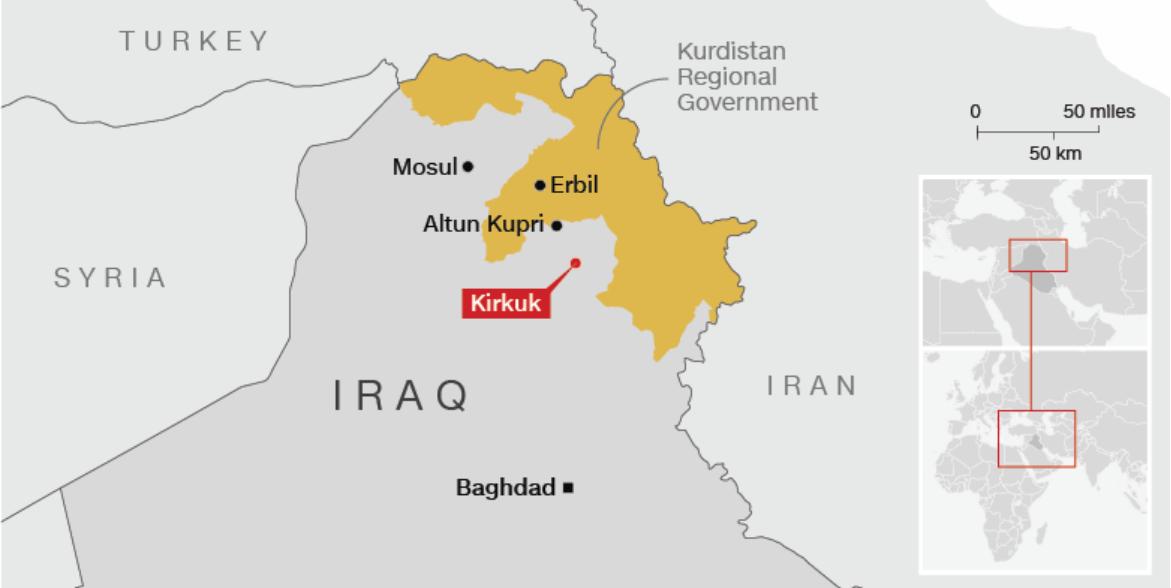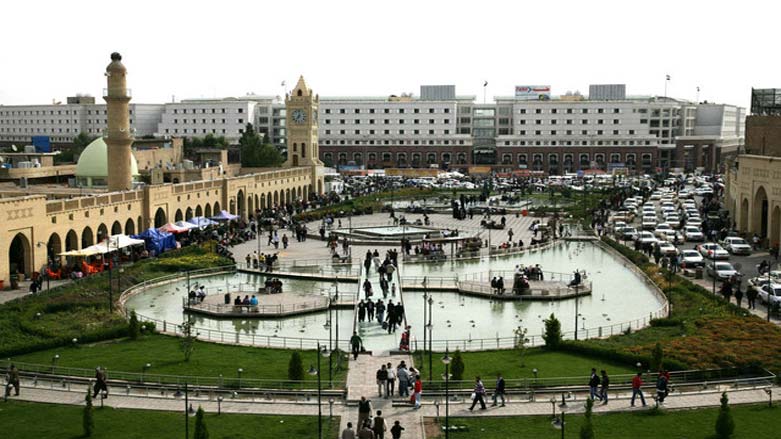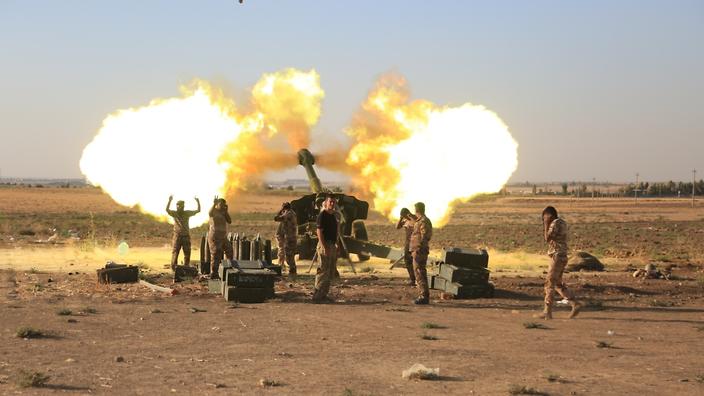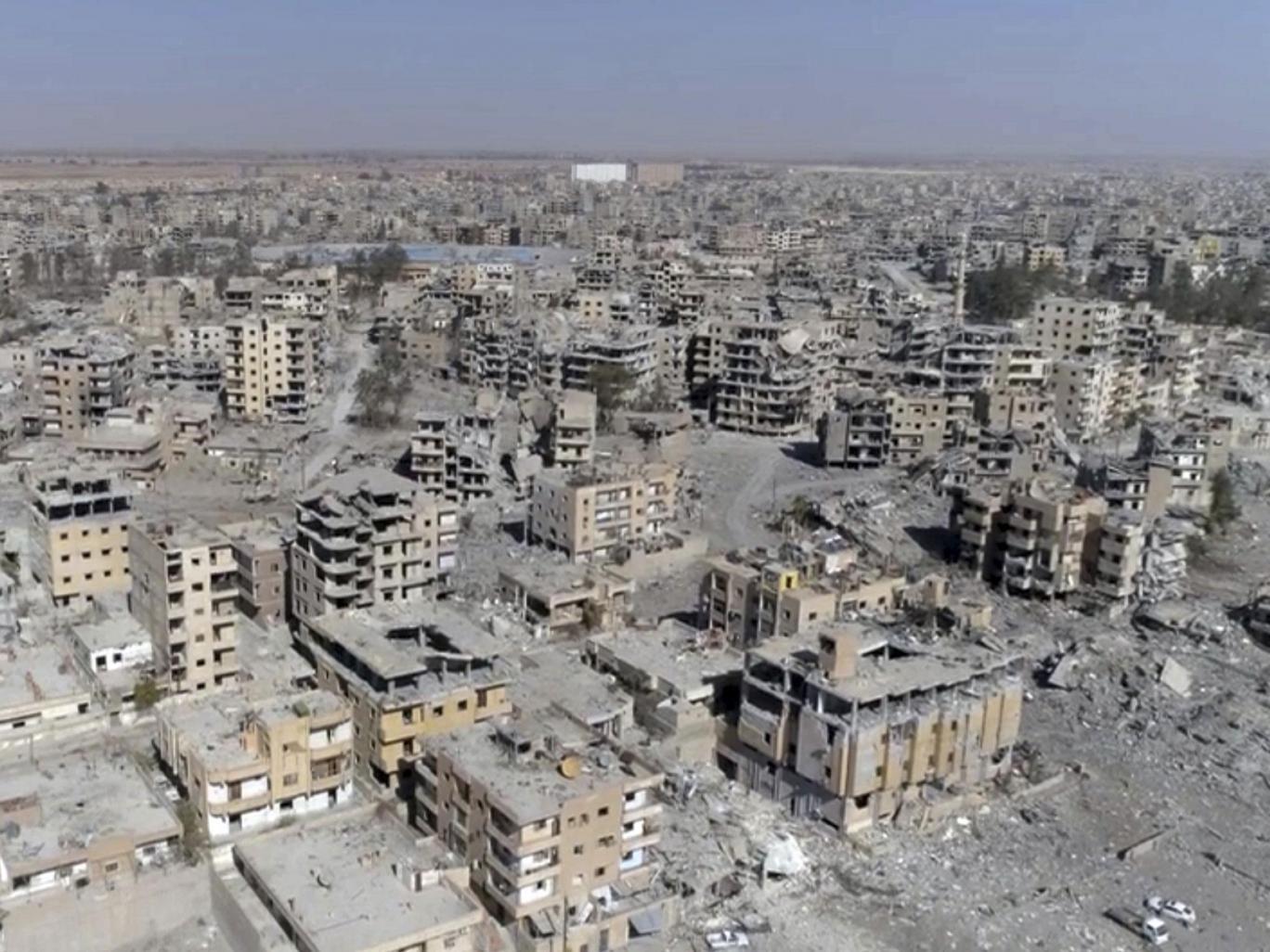It sounds like the Kurds have been out-maneuvered by the Iraqi regime; then left twisting in the wind by their American backers. Iraqi Abrams M-1 tanks (which are basically invincible against the light vehicles the Kurds have) were the convincing argument – the Iraqis inter-penetrated Kurdish positions in the Kirkuk area, essentially a peaceful “overrun” maneuver – and the Kurds realized that if they offered resistance, they’d be slaughtered.
The situation doesn’t look good for the Kurds, at all: the Iraqi military didn’t stop at Kirkuk, nor did they allow the Kurds to hold the oil wells north of the city – they are pushing north and expanding their area of control, which puts the Iraqi forces on a bee-line for Erbil, the capital of Iraqi Kurdistan.

Territorial holdings as of this week [source]
According to local reports the Kurdish forces near Altun Kupri tried to blow up a bridge to slow the Iraqi advance. Kurdish forces were armed with heavy machine guns and at least one howitzer, but footage indicated the Iraqi forces had a dozen artillery pieces with them and large numbers of armored Humvees. Footage showed Kurds sheltering behind hastily made defensive berms with a plethora of vehicles, including pickup truck “technical”, improvised trucks usually kitted out with a heavy machine gun or anti-aircraft cannons on the back. The mismatched forces, with the Iraqis using standardized US-equipment and the Kurds making due with a mish-mash of weapons illustrates what three years of war against ISIS has done to both groups of fighters. The US has trained almost 80,000 Iraqi soldiers and around 25,000 Peshmerga. Kurdish forces often lack the anti-armor weapons needed to slow down vehicles and have few responses to Iraq’s M1A1 Abrams. [jerusalem post]
The Kurds have a problem because they are mostly irregular troops, which were ideal for use as shock troops in house-to-house fighting, but they don’t have the kind of command/control and battlefield doctrine the US-trained Iraqi military have. The Iraqi military also have heavy artillery, which is the ideal tool for this kind of “ethnic cleansing lite” – you blast everything flat ahead of you and advance through the rubble.
Perhaps the reason that the US press is not covering what’s happening is because of the involvement of Iran:
Kurds say that the Iraqi forces include not only elite Counter-Terrorism fighters but also Iranian-backed Shia militias often called Hashd al-Shaabi. Iraqis tend to stress that this is an Iraqi army operation, whereas Kurds emphasize the Iranian role. There are also divisions within the Kurdish side with some Kurdish leaders associated with the Patriotic Union of Kurdistan supporting the Iraqi army against Kurdish forces associated with the Kurdistan Democratic Party.
Because of internal divisions in Kurdistan, they have probably divided and conquered themselves; my bet is that the Iraqi government is going to push all the way to Erbil. We may be about to see Kurdistan turning into a humanitarian disaster and genocide, when a few weeks ago we were thinking we might see a new ethno-nationalism.
The US’ strategy has played out exactly the way it was not supposed to: Iran is greatly strengthened, the alliance with Turkey is mortally damaged, and there will not be a client state in Kurdistan.

Erbil is a beautiful city. I hope we don’t have to watch US-made tanks and artillery, accompanied by Iranian militias, blasting it flat. I am afraid that the beast that devoured Raqqa and Mosul and Kirkuk is snuffling and lurching toward Erbil.
It seems that violent authoritarian nationalism is on the ascendant, worldwide – and I think the US’ political tone should get its share of the blame for that. American use of military force and unwillingness to negotiate fairly has demonstrated to authoritarian regimes around the world that military force is effective and that repression works. Worse, the US has demonstrated that weapons of mass destruction are the best path for a third-rate power to protect itself – the world has become a much more dangerous place in the last decade, not a safer or better one.

Iraqi military fire US-provided 155mm howitzers at Altun Kupri, while a US “advisor” mugs for the camera [source] This is the face of US foreign policy: grinning assholes firing high explosive area bombardment (a war crime)
Meanwhile, ISIS has been more or less turned from a proto-nation-state into an insurgency, with the fall of its capital Raqqa. The US coalition did to Raqqa as the Russians did to Grozny: they bombed it flat and marched in over the rubble. Then, they declared “freedom!” Or, as Tacitus said it better:
Auferre, trucidare, rapere, falsis nominibus imperium; atque, ubi solitudinem faciunt, pacem appellant.


One other side-effect of the swirling mess going on: US military technology is now everywhere and in everyone’s hands. I doubt the Iranians will try to build their own Abrams tanks, but there are multiple generations of ATGM and AA missiles all over the place; I’m sure technology intelligence officers are having a field day.

What happened to Kurdistan? Iran.
I can’t help thinking of Tacticus, in Terry Pratchett’s Jingo. At one point, Sam Vimes is deep in the desert of Klatch, and left in an area with crumbling remains of statuary and a city, one of the crumbling statues being that of General Tacticus:
It’s an extremely American attitude, and Ankh-Morpork is partly based on uStates. I still think Jingo is an amazingly incisive work on the idiocy of war.
Erbil (or, as it was known in classical antiquity, Arbela, before that Urbilum) has been weathering invasions and empires for over four thousand years.
The Sumerian and Babylonian kingdoms fought over it around 2000BC. The Assyrians ruled from it for centuries, before being displaced by the Medes. Cyrus the Great captured it for Persia in the 6th century BC, then Alexander defeated Darius nearby in 331BC. Then a brief period of Seleucid rule before it was disputed between Rome and the Sassanids for centuries. Muslim invasions from Arabia in the 7th century AD, sacked several times by the Mongols in the 13th century, Razed by Timur in the 14th century, rebuilt, seized by the Ottoman Turks in the 17th century, seized again by the British after World War I, and disputed between local powers and their Imperial backers ever since.
It’s one of the oldest sites of continuous human settlement on the planet, and it has never known peace for more than a few hundred years or so. Sadly what is happening there now is business as usual for Erbil.
cartomancer@#3:
Sadly what is happening there now is business as usual for Erbil.
Yes. And I tend to see that sort of thing as observations against the humanist idea that mankind is somehow getting wiser or more gentle. I doubt “your city has been razed over and over again!” is very comforting.
Brian English@#1:
What happened to Kurdistan? Iran.
Well, Iraq and the US screwed them, too.
Caine@#2:
“What?” he said aloud. “I can see your house from up here?
Aaahahahaa!!! That’s the punchline of a bad Jesus joke, in which Jesus is crucified and hanging on the cross but calls out to one of his disciples who endures various graphic beatings from the romans in order to crawl to the foot of Jesus’ cross:
“O Lord, what is it you wish to tell me?”
” I can see your house from up here!”
The campaign was lead (or planned) by a top Irani general (Qasem Soleimani), with Tehran’s blessing. The Shia Iraq government appears to be a vassal state of Iran. I’m not saying the US didn’t screw them, they did, just that Iran, using it’s Iraqui proxy decided no Kurdistan.
https://www.thenational.ae/world/mena/iranian-general-qassem-soleimani-visits-iraqi-kurdistan-amid-standoff-with-baghdad-1.667526
I am sad.
I thought that the Kurds had a chance at … uh … Statehood … Recognition…
I must have been drunk
#8 chigau
If it was just Iraq, I would agree with you. The would have had a good chance. The Kurds had an excellent chance at maintaining an autonomous, essentially independent, state within Iraq, as now, but with a better and formal deal with Baghdad.
The real issue is that Iran, Turkey and Syria all have very substantial Kurdish populations. IIRC the Iranian one is well over 20% and most are just across the border.
Turkey has been fighting a Kurdish separatist movement on and off for perhaps 30 years. That is why Turkey was so upset when the USA began to arm the Iraqi Kurds; it sees no real difference between an Iraqi Kurd and a Turkish Kurd. For Turkey, a truly independent Kurdistan is non-negotiable, that is completely unacceptable.
An independent Kurdish state would almost certainly motivate separatist movements in the other two states. The threat of an independent Kurdistan was the only thing that could get four countries to unite but it was obvious it would. I have no idea what the Kurds imagined they were doing. Probably they were drunk.
They did not have a hope in hell of real formal independence without the USA being willing to fight a “real” war for them against Iran, Turkey and Syria and with an Iraq in revolt against their US “advisors”.
An independent Kurdistan has the possibility to turn the entire region into an inferno. The Orange Buffoon in Mar a Lago and his treatment of Iran is not improving things.
This, almost certainly, would bring in Russia. Russia’s reluctant involvement in the mess in Syria has nothing to do with maintaining its naval base at Tartus or “projecting power” in the Mediterranean as some idiot commentators, usually American, say.
Putin and, I imagine, the entire Russian cabinet were horrified at the results of the US invasion of Iraq which resulted in the closest thing to a ruined state that we ever want to see. The subsequent fiasco in Libya did produce a ruined state.
This area of the Middle East is Russia’s backyard. Putin does not want some kind of swirling, civil wars, revolutions, independence wars there or anywhere.
I know this is an after-the-fact claim, but things are unfolding on the strategic (?) level more-or-less as I had expected but I had never thought that an Iranian intervention might be that effective, let alone that fast.